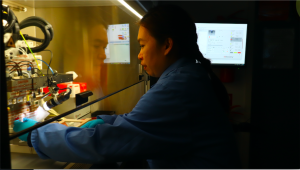Philippines

Related Research:
The research titled “Engineered Smart Concrete Utilizing Indigenous Wastes for Durable and Intelligent Infrastructure,” led by Dr. Chosel P. Lawagon at the University of Mindanao and a Department of Science and Technology-funded research focuses on developing advanced concrete materials incorporating indigenous waste fibers to enhance infrastructure durability and intelligence. The study investigates explicitly self-healing and self-sensing properties to address critical infrastructure challenges. Self-healing concrete uses fibers such as from various agricultural wastes–banana pseudostem, coconut husk, durian rind, and papaya bast–which act as carriers for self-healing agents that promote crack healing. The research demonstrated that encapsulating these self-healing agents in the concrete mix significantly improved mechanical properties, reduced water absorption, and healed visible cracks from 14 to 28 days. The encapsulated agents interacted with the cementitious matrix, forming healing products that filled cracks. These findings indicate that incorporating indigenous waste fibers in concrete can effectively enhance its durability and longevity. In addition to self-healing properties, the research also explored the self-sensing capabilities of smart concrete. The non-fibrous parts of the indigenous agricultural wastes were transformed into self-sensing materials crucial for efficient structural health monitoring. The study utilized nanostructural carbonaceous materials synthesized from indigenous wastes to impart electrical properties to the concrete, enabling it to sense stress and damage autonomously. The research highlighted the potential for real-life applications in enhancing infrastructure resilience. Integrating self-healing and self-sensing properties in innovative concrete improves structural durability for climate-resilient infrastructure. The research promotes sustainable practices and contributes to developing infrastructure that can better withstand and adapt to environmental stresses by using indigenous waste materials. The source of raw materials is from local communities (Tungkalan Coconut Farmers Cooperative, Philippine Fiber Industry Development Authority) to foster partnerships with them and open possible new income generation opportunities. This partnership is essential since the research is geared towards large-scale production for potential commercialization.
Relation to Climate Resilience and Adaptation Theme:
This research is directly aligned with the “Climate Resilience and Adaptation” theme, which emphasizes the need for resilient infrastructure capable of withstanding the impacts of climate change. By utilizing locally sourced waste materials, the project addresses waste management issues and reduces the carbon footprint associated with traditional concrete production. This sustainable approach supports the development of resilient urban infrastructure that can endure extreme weather events and other climate-related stresses. Moreover, the cost-efficiency and accessibility of these advanced materials foster inclusive economic growth, benefiting local communities and enhancing their capacity to adapt to a changing climate. Also, the collaboration with local cooperatives (Tungkalan Coconut Farmers Cooperative) and industries (Riezl Landcare & Construction, PhilFIDA, and DPWH-BRS) demonstrates significant community engagement. The involvement of local initiatives and the use of indigenous knowledge contribute to building community resilience. Thus, the project exemplifies how innovative scientific solutions can fortify ASEAN’s socio-economic stability and environmental sustainability in the face of climate challenges. This scientific approach further highlights how it can empower ASEAN countries to combat the adverse effects of climate change, ensuring sustainable urban development and resilient communities.
Affiliated Organisation:
Center of Green Nanotechnology Innovations for Environmental Solutions, University of Mindanao
